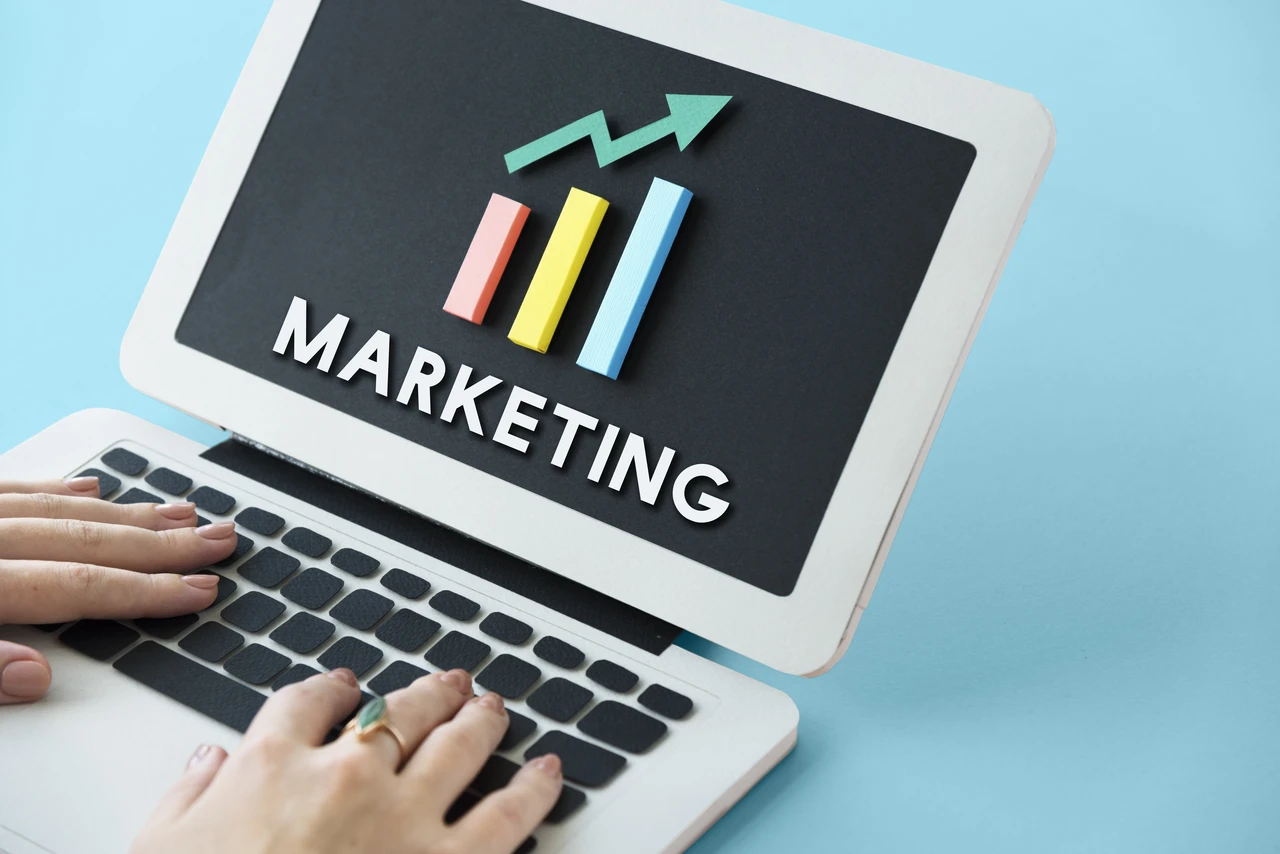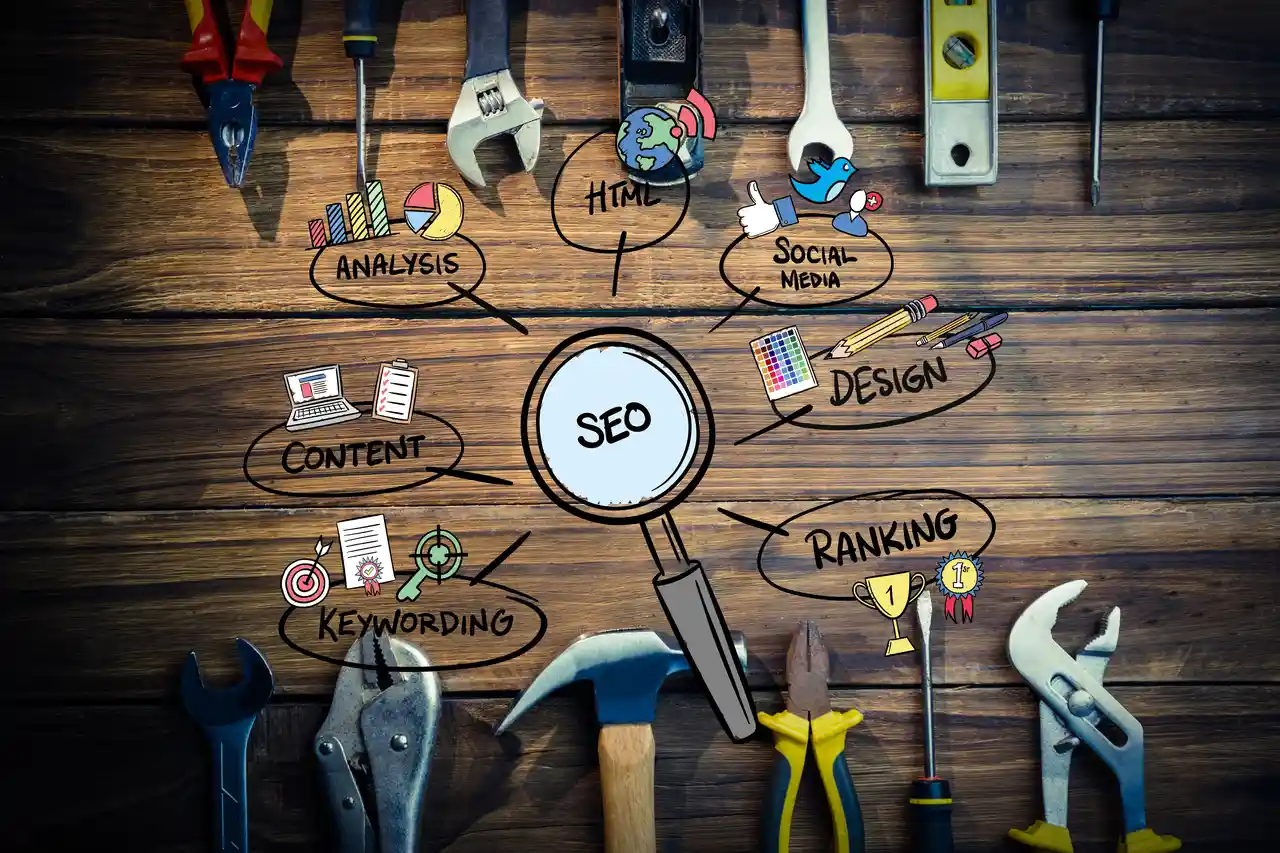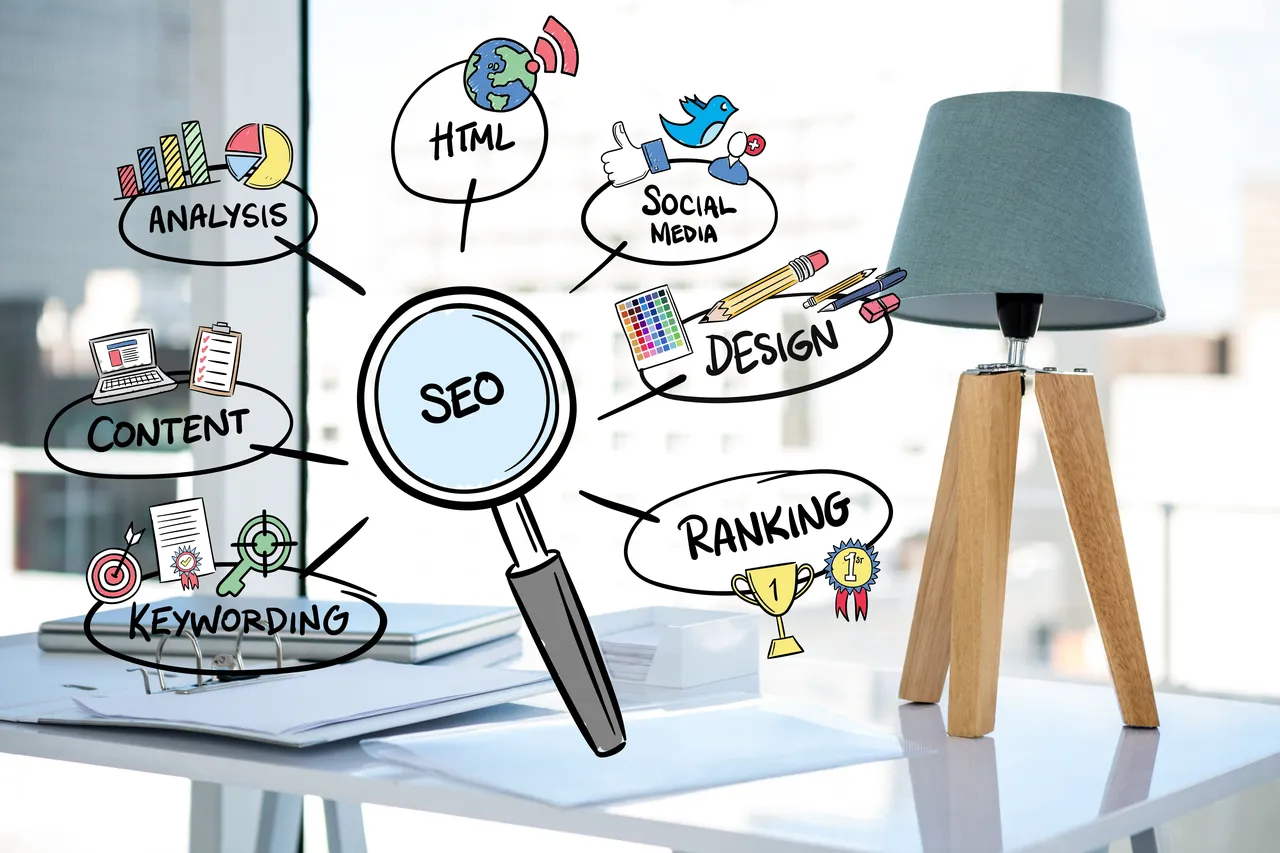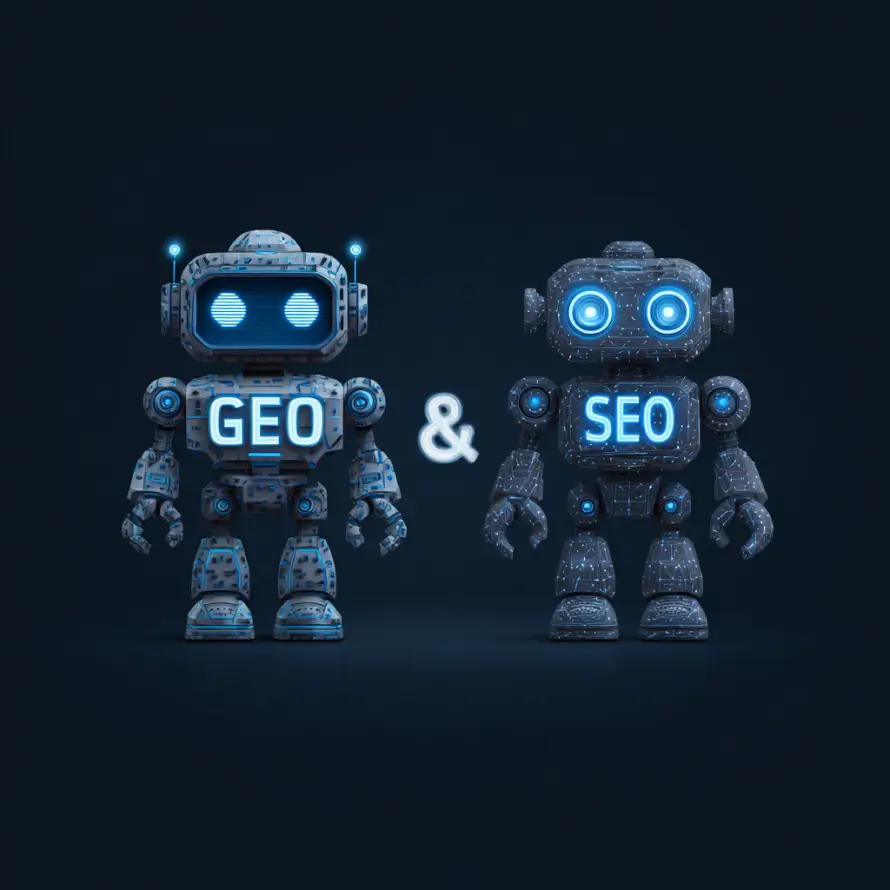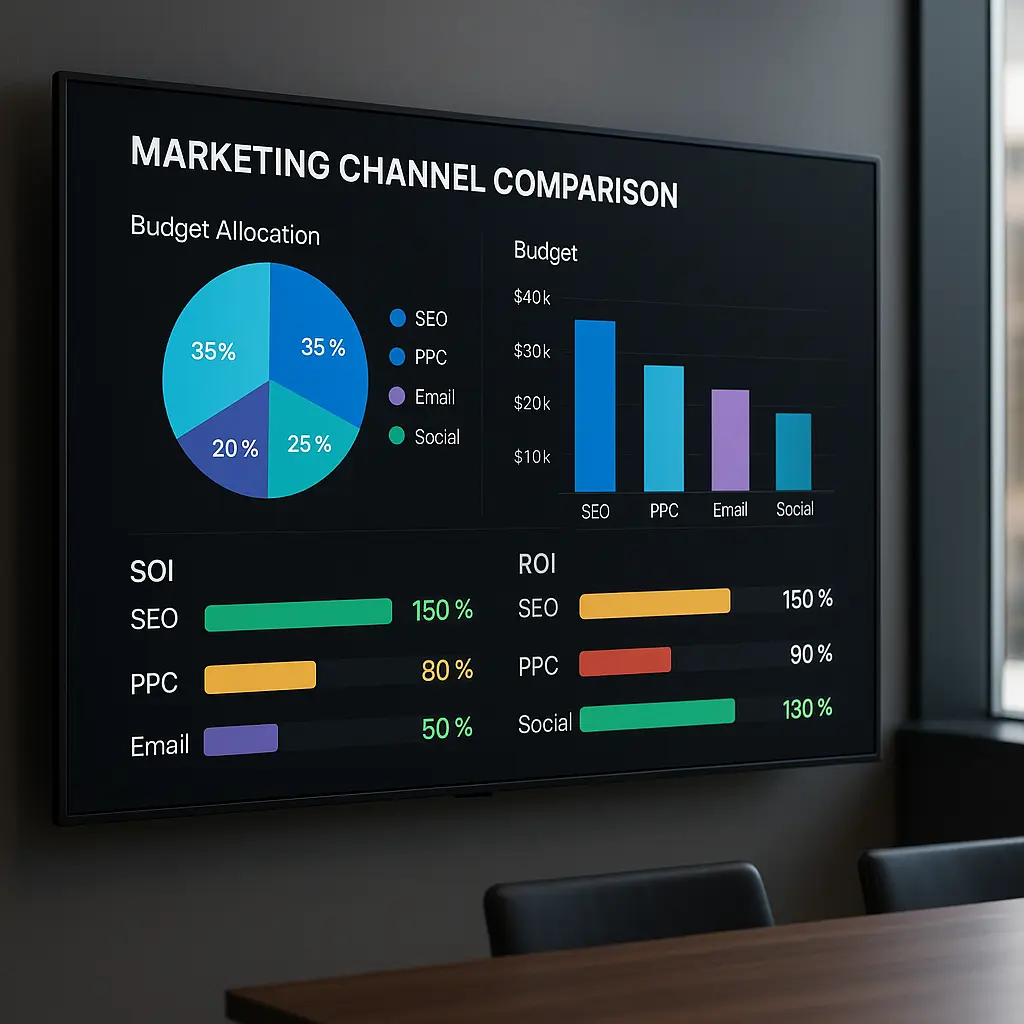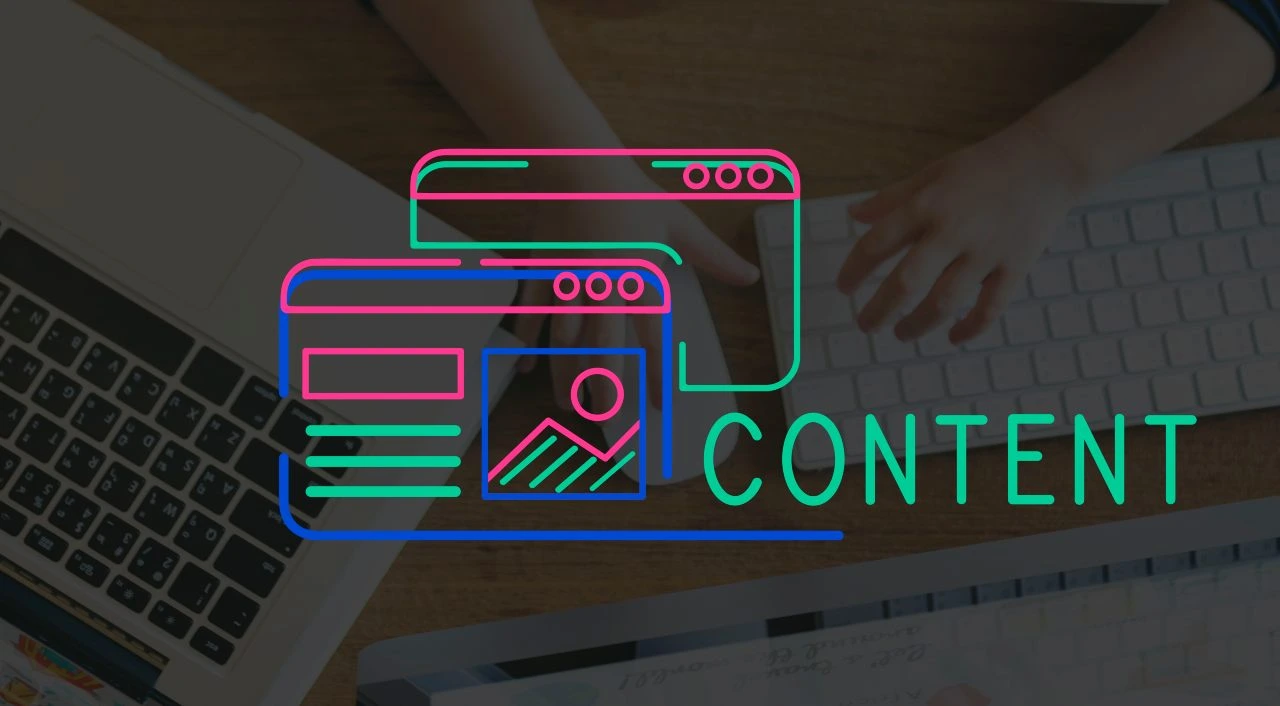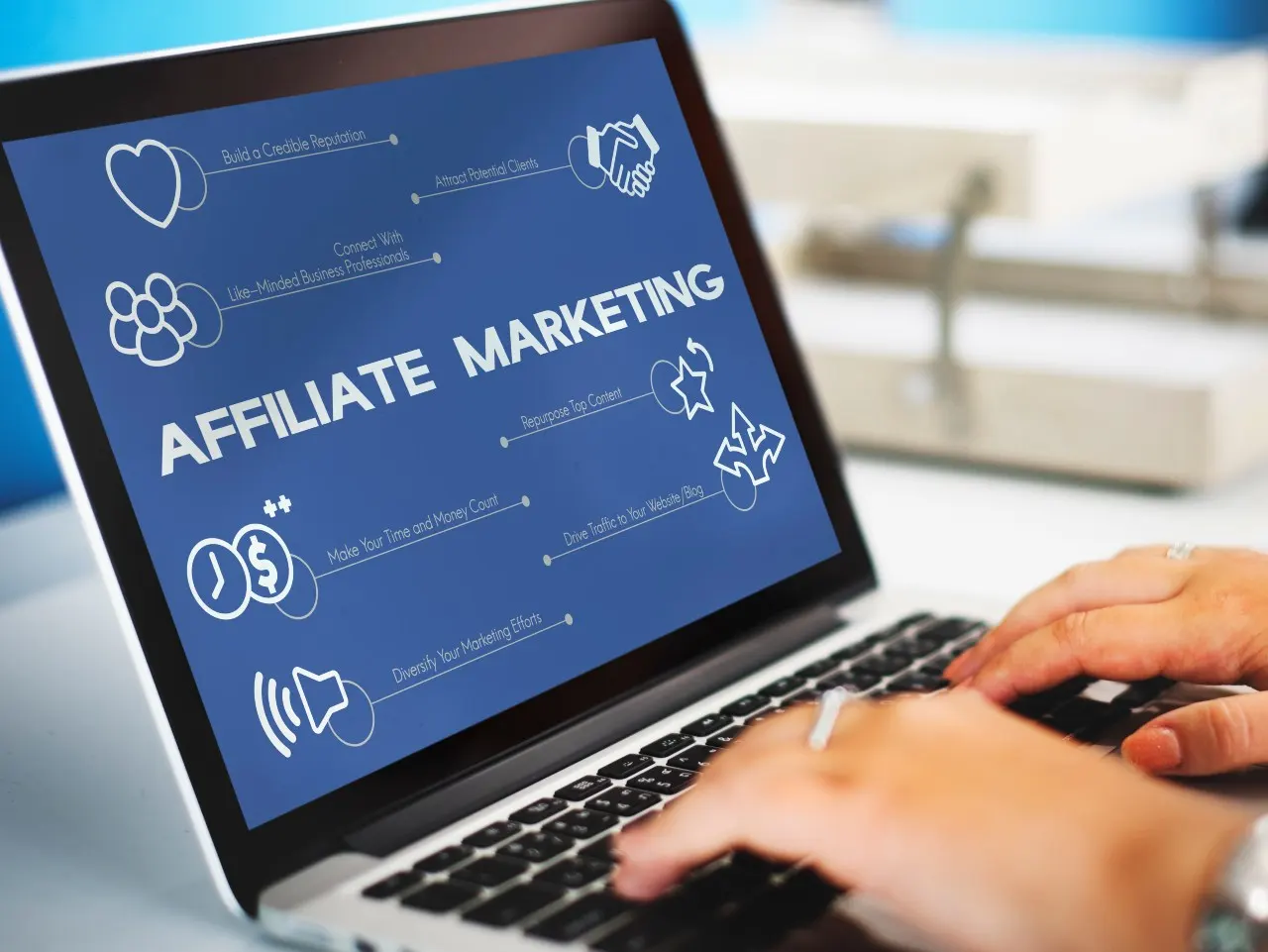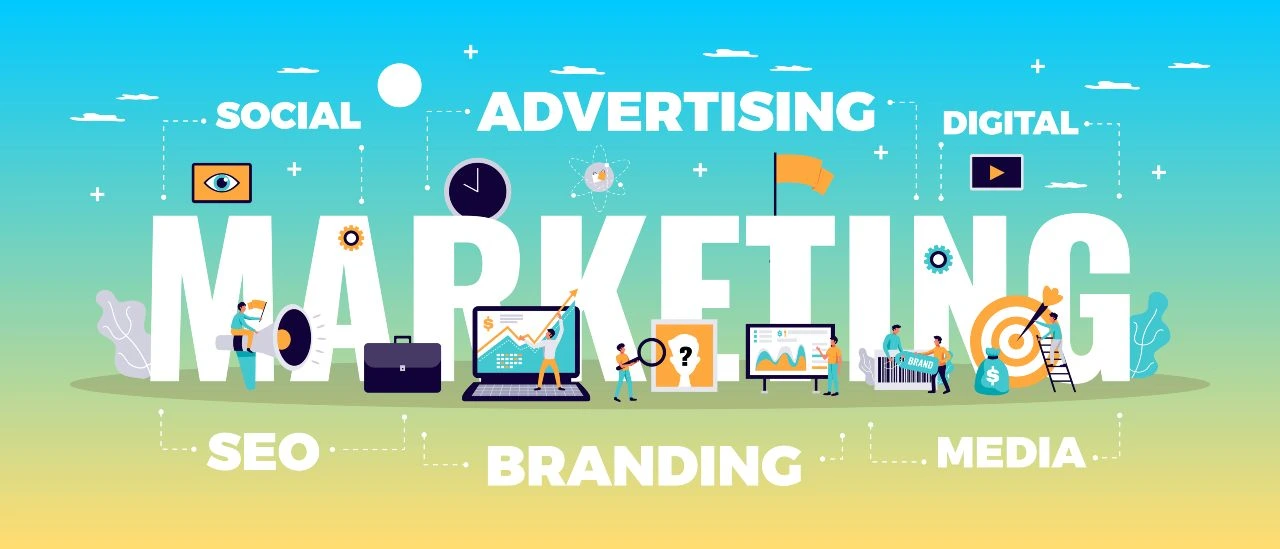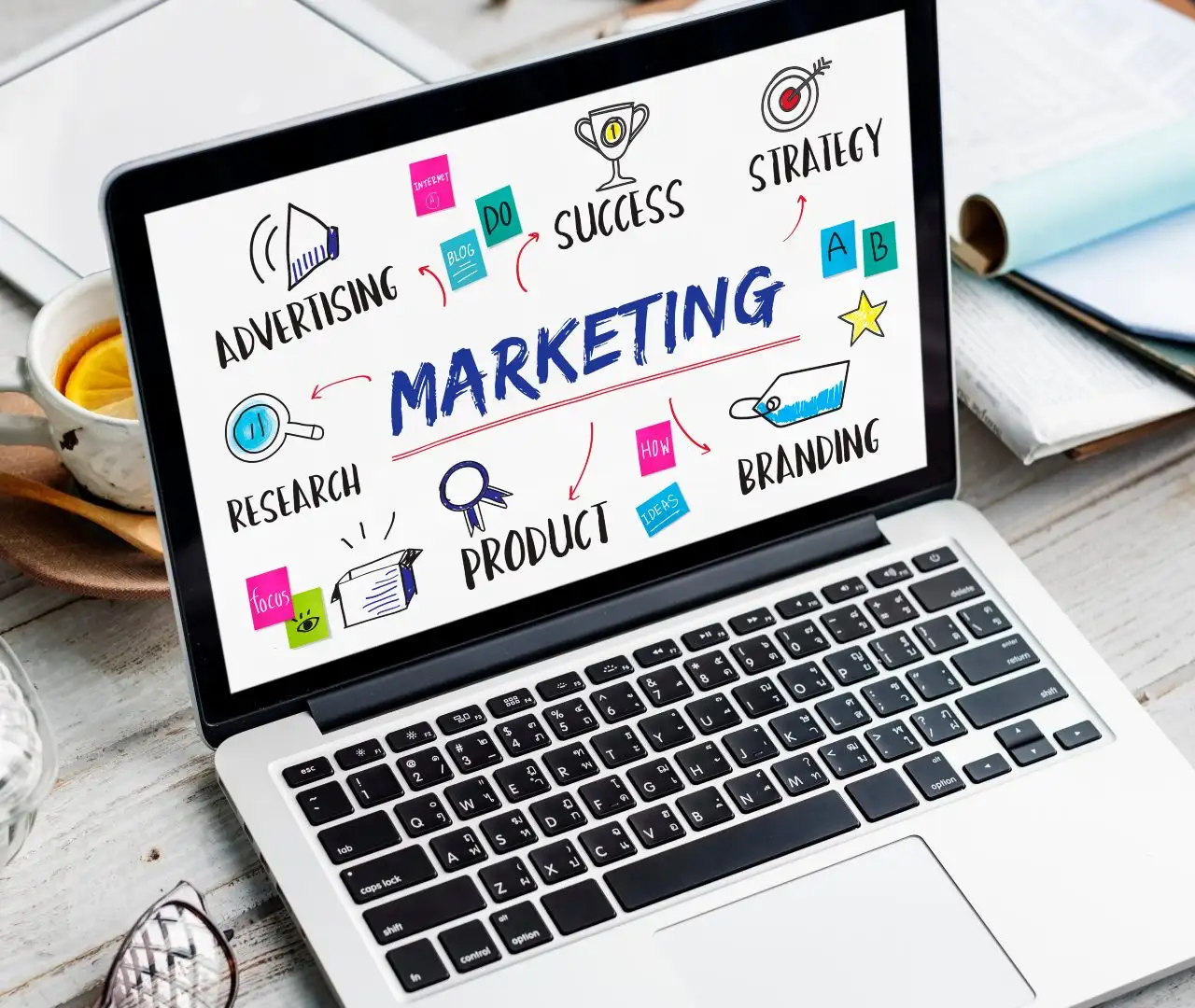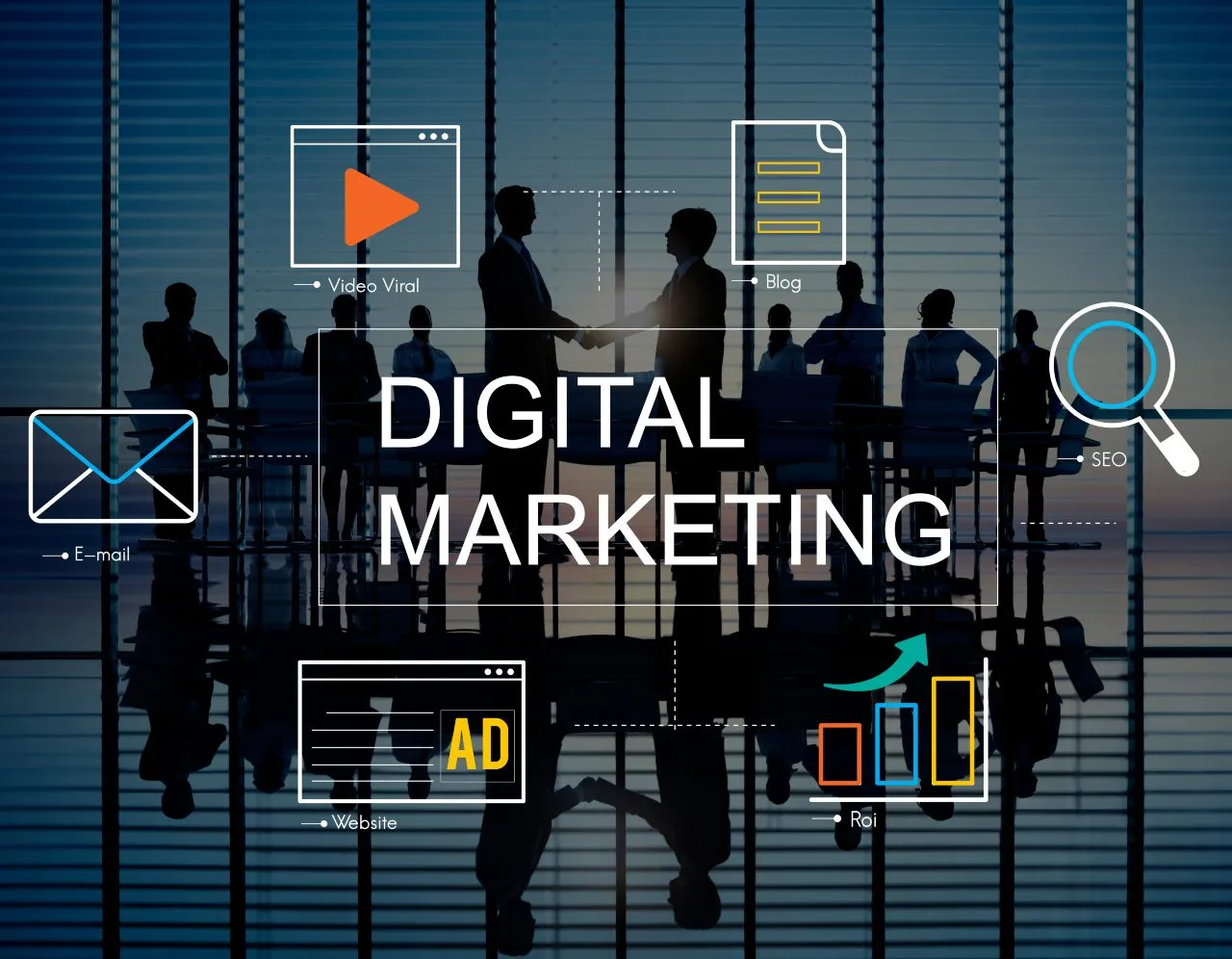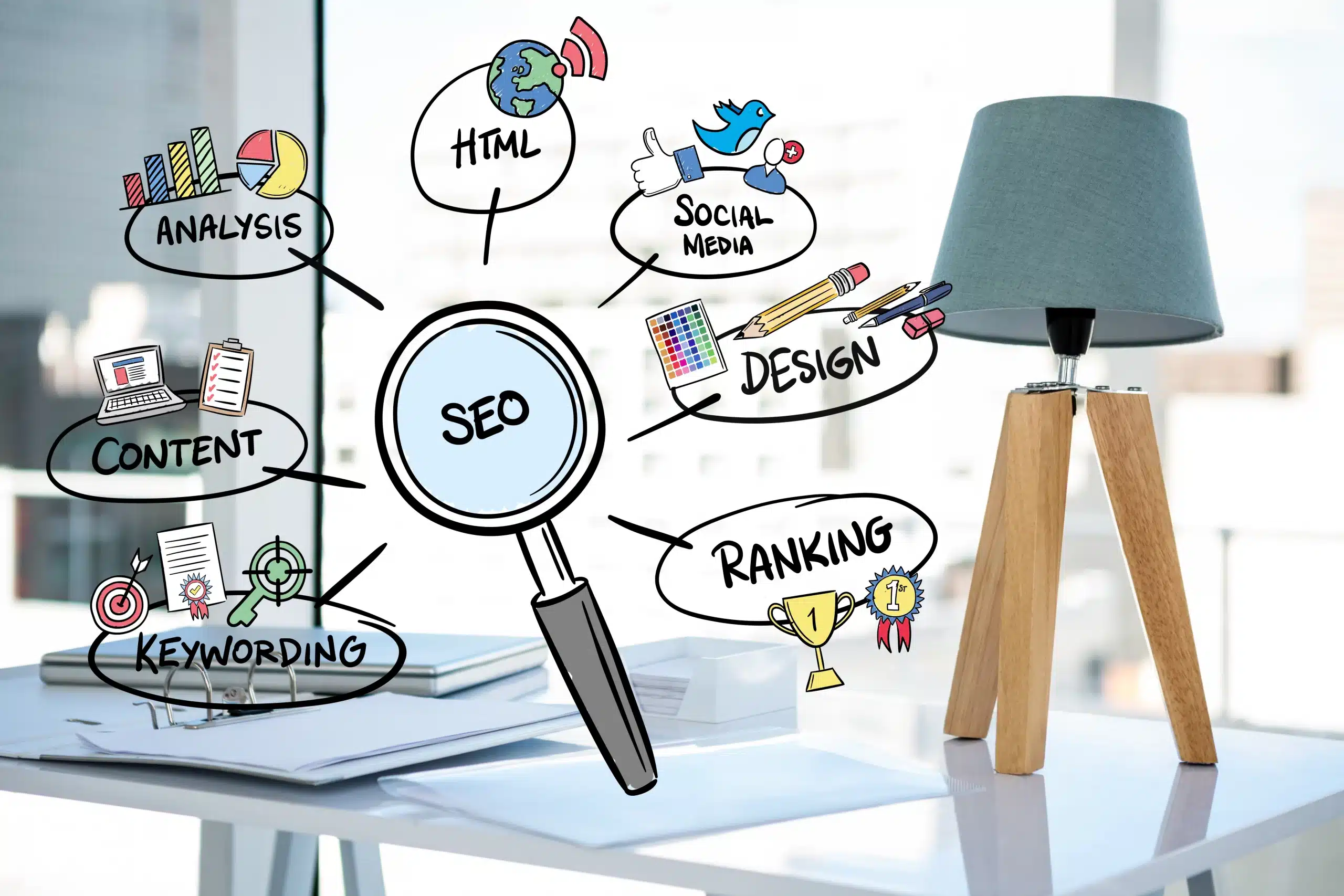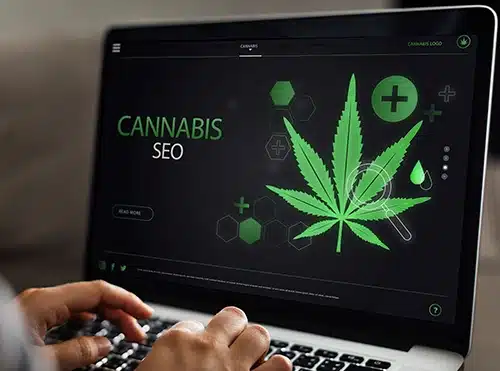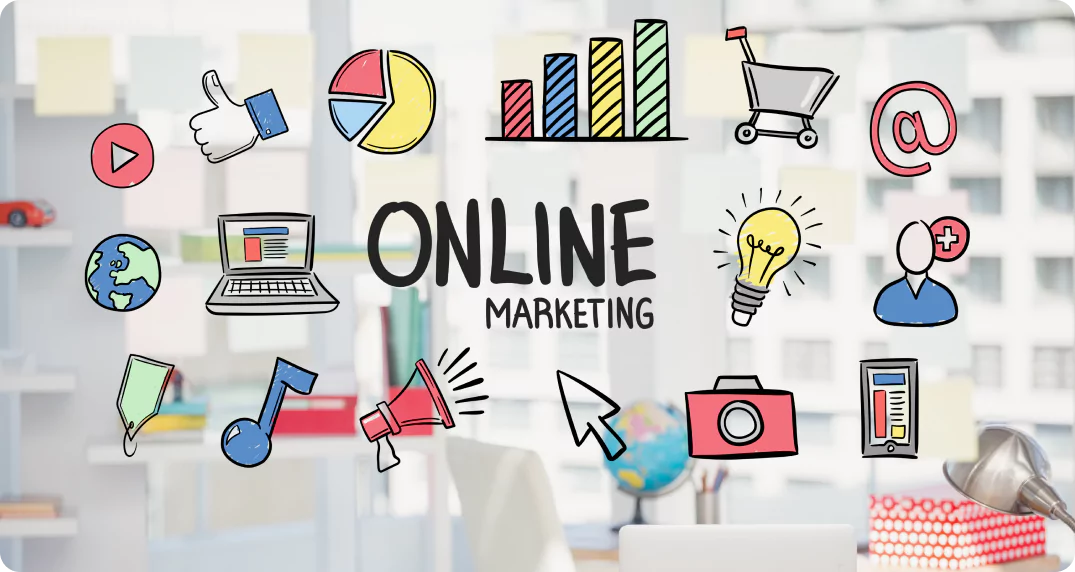Did you know that email remains a top channel for B2B communication? Or that AI is revolutionizing content creation within email strategies? With the rapid evolution of digital marketing, staying informed about current trends and benchmarks ensures your strategies are not just relevant but also highly effective.
In this article, we dive deep into the latest B2B email marketing statistics and trends. We’ll explore AI’s growing influence, channel preferences, content marketing trends, and the challenges marketers face, offering you actionable insights to boost your email marketing performance.
The Growing Role of AI in Marketing Strategies
Artificial Intelligence is no longer a futuristic concept in marketing—it’s the present reality reshaping how brands connect with their audiences. From streamlining workflows to creating hyper-personalized customer experiences, AI is empowering marketers to dig deeper, work smarter, and execute campaigns with precision. As businesses navigate increasingly competitive landscapes, investing in AI tools is emerging as more of a necessity than a choice. Let’s take a closer look at how marketers are adopting AI and where they’re focusing their efforts.
- More than half of all marketers plan to increase their AI investments within the upcoming year. Source
- 35% of marketers are already leveraging AI tools to strengthen their social media strategies. Source
- A significant 25% of marketers are using AI to better understand their customers and fine-tune their audience targeting. Source
Key Takeaway: AI Is the Catalyst for Smarter Marketing
The adoption of AI in marketing is more than a passing trend—it’s a transformation that’s reshaping the industry from the ground up. By using AI to analyze data, predict customer behavior, and deliver personalized content at scale, marketers can do more with less and achieve far better outcomes. As competition intensifies, those who embrace AI will not only unlock new efficiencies but also gain a significant edge in understanding and serving their audiences.
Pro Tip:
Stay ahead of the curve by integrating AI tools that align with your specific marketing goals. For example, use AI-powered platforms to automate repetitive tasks like email segmentation or predictive analytics to identify opportunities for personalization. Tools such as Salesforce Einstein, Marketo, and Jasper AI can provide actionable insights and streamline your workflows. Exploring complementary strategies, such as email marketing B2B lead generation, can further enhance your marketing efforts by driving targeted engagement and conversions.
How AI is Revolutionizing B2B Marketing Strategies
AI is no longer just a buzzword in B2B marketing—it’s a game-changer reshaping how businesses approach content creation, email campaigns, and automation. From improving productivity to driving hyper-personalized customer interactions, the integration of AI into marketing workflows allows marketers to move beyond repetitive tasks, enabling them to focus on higher-value strategies. Whether it’s enhancing copywriting or optimizing campaigns, AI’s role in modern marketing is becoming indispensable. Let’s dive into the data that demonstrates the power and impact of AI in B2B marketing.
- 64% of marketers are currently using AI tools to assist with content creation. Source
- Over half of marketers leverage AI to improve copywriting for email marketing, organic search, and social media. Source
- 85% of marketers note that generative AI has influenced their content creation processes in 2024, while 63% expect AI to handle most of their content creation in the future. Source
- 83% of marketers believe AI is enhancing their SEO efforts by aiding in the production of high-quality, optimized content. Source
- 76% of marketers report that AI boosts productivity, while 52% highlight its role in improving customer engagement. Source
- 57% of B2B companies are using generative AI to accelerate content production, 41% to develop innovative campaigns, and 35% to gain a competitive edge. Source
- 96% of marketers believe AI will become even more critical in their strategies over the coming years, reflecting a significant rise from previous years. Source
- 64% of marketers are already using AI and automation in their campaigns today. Source
- 35.29% of marketers plan to adopt marketing automation for paid advertising in the near future. Source
- Proper implementation of marketing automation has been shown to drive results like higher email open rates and click-through rates, leading to significant growth in leads and conversions. Source
Key Takeaway: Unlocking the Possibilities of AI in Marketing
AI’s growing influence in B2B marketing is nothing short of transformative. Beyond the numbers, these statistics tell a larger story of how AI is enabling businesses to work smarter while maintaining a competitive edge. As AI continues to become more sophisticated, marketers can unlock new opportunities for crafting impactful campaigns that resonate with their audiences. From accelerating content production to refining email strategies and automating workflows, AI isn’t just a supplementary tool—it’s a strategic necessity that can amplify performance at every touchpoint.
Pro Tip:
Start small and scale strategically. Use AI to automate repetitive tasks like email segmentation, A/B testing, or performance tracking, freeing up time for creative strategy development. Begin personalizing email campaigns based on analytics and customer behavior, and as you gain confidence, explore more advanced use cases, such as predictive analytics and dynamic content generation. While AI can streamline processes, ensure a human touch remains central to your marketing efforts to maintain authenticity and trust.
For businesses looking to streamline their campaigns even further, outsourcing email marketing could be the key to elevating their digital marketing strategies. By leveraging external expertise, companies can focus on implementing AI-driven insights while ensuring their email outreach remains effective and engaging.
Why Email Marketing Remains the Backbone of B2B Strategies
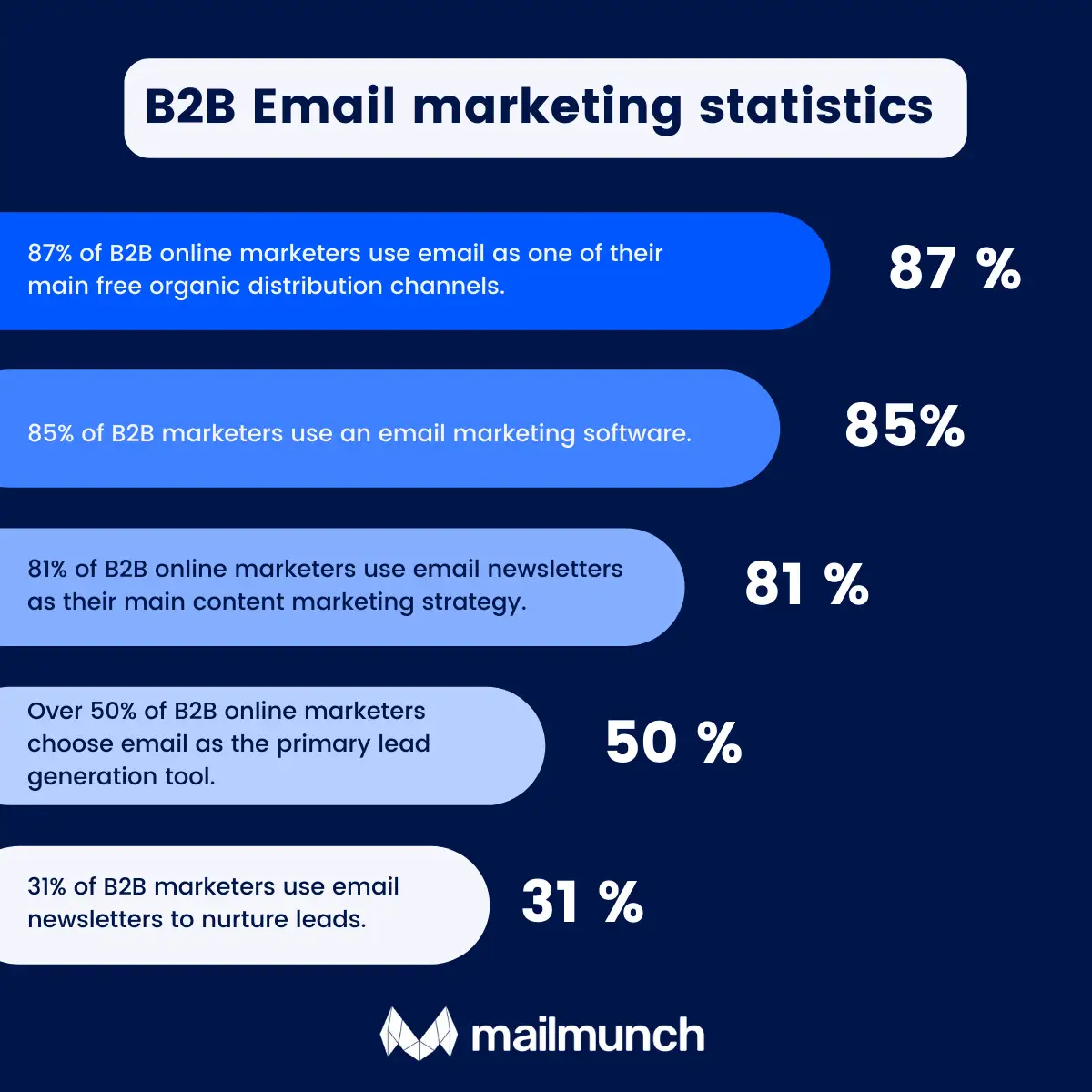
Source: Mailmunch
In an era where digital channels are abundant, email continues to distinguish itself as the cornerstone of B2B marketing. Its ability to deliver direct, personalized communication makes it indispensable in building relationships, nurturing leads, and driving conversions. But what sets the most successful strategies apart in the competitive B2B landscape is how marketers are coupling email marketing with smart investments in content creation, thought leadership, and advanced automation tools.
- A noteworthy 77% of B2B buyers prefer email as their main communication channel, emphasizing its role in effective outreach. Source
- Nearly half (45%) of B2B marketers plan to increase their content marketing budgets in 2024, signifying a growing awareness of the impact of quality content. Source
- Video content continues to gain traction, with 69% of B2B marketers globally committing budget to video marketing in 2024. Source
- Thought leadership remains a key priority, with 53% of marketers investing in this form of content to establish authority and trust. Source
- A 2024 study shows that 19% of B2B marketing budgets are allocated to advertising, with an additional 17% invested in content creation—a trend projected to continue into 2025. Source
- As content distribution evolves, websites and social media remain top channels for video, while interest in AI-driven optimization for enhanced platform performance is growing. Source
Key Takeaway: Where Strategy Meets Innovation
The numbers don’t lie—email marketing is deeply rooted in B2B success, but its true potential is unlocked when paired with forward-thinking strategies. The rise in video investment and thought leadership content shows a clear shift toward more engaging, authoritative approaches, while AI-powered tools are helping fine-tune every touchpoint of the buyer journey. To stay competitive, marketers need to think beyond traditional email tactics and adopt a multi-channel, data-driven strategy that blends creativity with technology.
Pro Tip:
Keep your campaigns one step ahead by embracing AI for predictive analytics, A/B testing, and hyper-personalized content creation. Additionally, use video in your email strategy to boost click-through rates and engagement—embed product demos, tutorials, or customer testimonials for maximum impact. And don’t forget: thoughtful segmentation is the linchpin of any great B2B email campaign.
Blogging: The Backbone of B2B Content Marketing Success
Amid the complexities of B2B marketing, blogging remains a foundational tactic, offering unmatched potential to engage, educate, and convert audiences. When done right, blogs don’t just sit on your website; they fuel other marketing efforts like email campaigns, SEO strategies, and social media outreach. As part of a broader B2B website strategy, blogging plays a key role in driving visibility and trust. If you’re not leveraging this versatile tool, you’re likely missing out on opportunities to nurture leads and build stronger relationships with your target audience.
Key Takeaway: Blogging is Far More Than an SEO Booster
Beyond driving website traffic, blogs are a powerful way to build authority and trust within your niche. They create evergreen content assets that can be shared in email newsletters, repurposed as social media snippets, or even transformed into gated content to generate leads. And the best part? Blogs provide the depth and nuance that many other content formats lack, making them indispensable in the B2B buying journey.
Pro Tip:
Don’t just write and forget—think multi-channel. Repurpose blog content into other formats like podcasts, webinars, or even downloadable guides. This approach not only amplifies your reach but ensures your valuable insights resonate across diverse audience preferences.
Overcoming Content Creation Obstacles in B2B Marketing
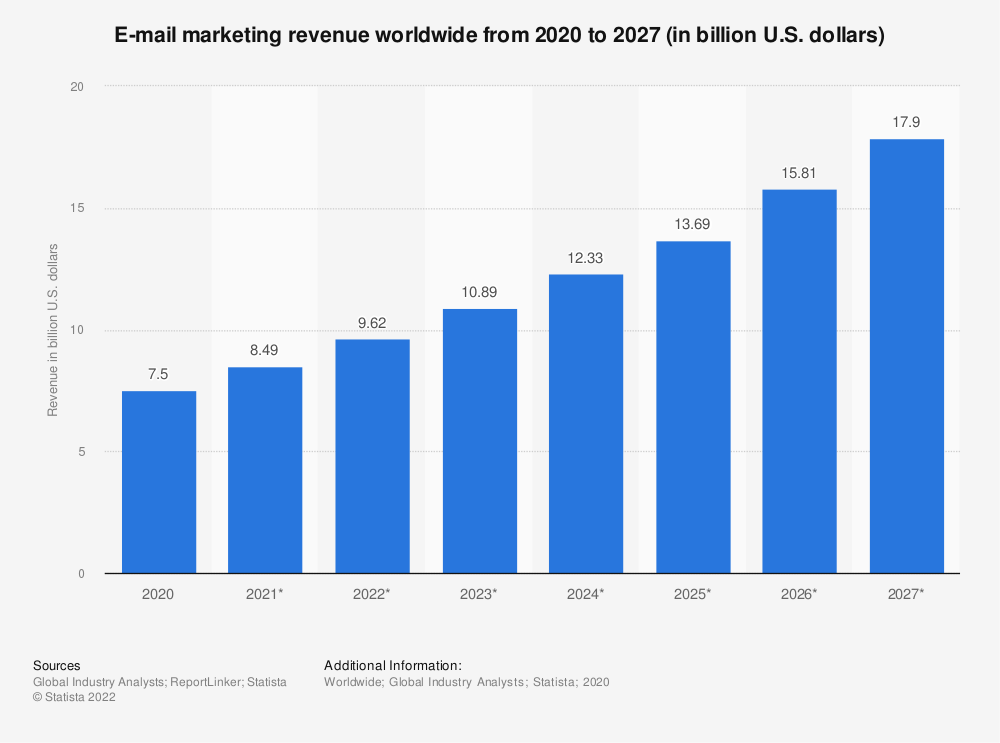
Source: Fine Media
In the fast-paced and competitive world of B2B marketing, crafting impactful content isn’t just about filling a blog or email campaign—it’s about delivering value that resonates with your target audience. Despite advancements in tools and strategies, marketers still face challenges in producing high-quality, engaging, and scalable content. These hurdles can significantly impact customer engagement and lead generation efforts, making it crucial to pinpoint and address specific pain points in the content creation process.
- 55% of B2B marketers identify creating engaging content as their primary challenge, outpacing other difficulties. Source
- The proportion of marketers struggling to create the right content for their audience dropped from 57% last year to 40%, reflecting better targeting practices. Source
- 45% of marketers report they lack a scalable content creation process. Source
- 39% of marketers still face difficulties in producing enough content to meet demand. Source
- Challenges in differentiating content dropped from 54% last year to 43%, while maintaining consistency improved from 54% to 42%. Source
- SEO optimization concerns have decreased, with only 35% of marketers identifying it as a major challenge, down from 45%. Source
- The struggle to produce quality content has also eased, with just 27% of marketers facing this issue compared to 44% in the previous year. Source
These statistics indicate that while B2B marketers are making strides in areas like targeting audiences and producing higher-quality content, gaps persist in addressing scalability, volume, and engagement. To truly excel, marketers must move beyond just identifying challenges and instead adopt smarter, more structured workflows that integrate innovative tools and processes.
Key Takeaway: Building a Future-Proof Content Strategy
The evolution of B2B content marketing is evident—marketers are getting better at personalization and narrowing their focus to meet audience expectations. However, the lingering challenges of scalability and engagement highlight the need to rethink how content is produced and distributed. By leveraging automation tools, improving internal collaboration, and actively monitoring audience behavior, B2B marketers can turn these challenges into opportunities for growth.
Pro Tip:
Don’t just focus on creating new content—think evergreen. Repurpose your most successful pieces across multiple formats (e.g., turning a webinar into a blog series or infographic) to maximize ROI while saving time and resources. Regularly updating and optimizing older content for SEO can also keep your strategy fresh and aligned with industry trends.
The Challenges of Measuring B2B Content Marketing ROI
In the world of B2B marketing, crafting impactful content is only half the battle—the real challenge lies in quantifying its success and improving digital marketing ROI. Accurately measuring ROI and tying it back to business outcomes remains a persistent struggle for many marketers. Whether it’s navigating fragmented data systems or justifying budgets to stakeholders, these roadblocks can stall even the most promising content strategies.
- 56% of marketers experience difficulty with both attributing ROI to content and tracking customer journeys effectively. Source
- 44% find it challenging to directly correlate content performance with overall business objectives. Source
- 41% cite limited resources or budget constraints as significant barriers to measurement. Source
- 39% struggle due to a lack of clear marketing goals or KPIs, preventing a focused evaluation of results. Source
- Data silos inhibit 37% of marketers from obtaining a comprehensive view of content performance. Source
- 33% face limitations due to insufficient access to advanced analytics tools. Source
- Inadequate or overly complex reporting systems hinder 29% of marketers. Source
- Another 29% report difficulties in extracting actionable insights from data and analytics. Source
- 25% lack the necessary data skills or internal talent required for content measurement. Source
Achieving meaningful insights from content marketing isn’t just about fixing one pain point; it’s about tackling a web of interconnected challenges. From bridging data silos to aligning performance metrics with business goals, the key lies in creating a system that integrates strategy with analytics seamlessly.
Pro Tip:
Begin by establishing a roadmap for success—set SMART (Specific, Measurable, Achievable, Relevant, Time-bound) goals, train your team in data literacy, and leverage analytics platforms that provide both granular and big-picture insights. With the right structure in place, turning performance data into actionable strategies becomes far more attainable.
Decoding the Challenges of Marketing Automation Tool Selection
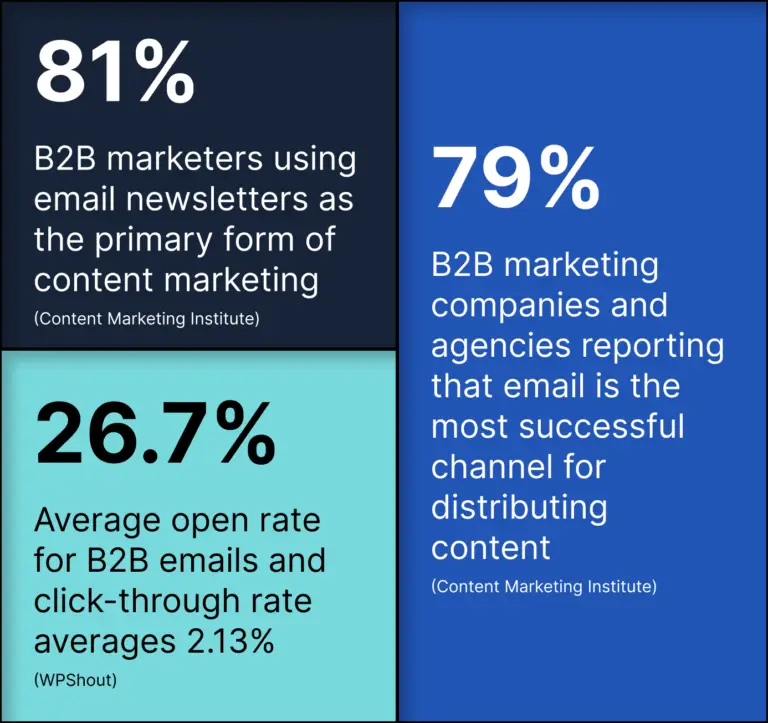
Source: DBS Interactive
In the world of B2B marketing, automation tools are no longer a luxury—they’re a necessity to stay competitive. However, while their potential to streamline processes is undeniable, many marketers find themselves struggling to identify platforms that align with their specific goals and workflows. This creates a critical gap, as the right tools can significantly elevate campaign performance, enhance lead nurturing, and improve ROI. Let’s explore why finding the perfect fit remains such a persistent obstacle.
- 66% of marketers report difficulty in identifying marketing automation tools that truly meet their needs. Source
- Similarly, 66% state that no existing solution fully addresses their unique requirements. Source
Key Takeaway: Prioritizing Strategy Over Features in Automation Tool Selection
The statistics highlight a recurring issue—marketers often approach automation tools with a desire for a one-size-fits-all solution, which rarely exists. Instead of focusing solely on features, businesses should adopt a strategy-first approach by clearly defining their goals and understanding where technology can bridge gaps in their processes. Additionally, flexibility is key—customizing tools through integrations or configurations can help overcome limitations and make platforms work for your team, not the other way around.
Pro Tip:
Don’t overlook scalability when selecting a marketing automation tool. Opt for solutions that not only solve your immediate challenges but can also grow with your business needs, ensuring long-term value and performance. Running a small-scale trial with real campaigns can be a game-changer in narrowing down the best fit for your organization.
Overcoming Challenges in Marketing Automation and Content Creation for B2B Email Marketing
Effective email marketing hinges on both robust automation and compelling content. However, B2B businesses often encounter hurdles in fully leveraging marketing automation and creating impactful content.
- 41% of B2B businesses report that they are not getting the most out of their marketing automation systems. Source
- A significant 63% of marketers identify driving traffic and generating leads as their biggest struggle when it comes to content creation. Source
- Many content marketers struggle with scaling content production, with 49% admitting they don’t repurpose content enough. Source
These statistics highlight the need for B2B marketers to address challenges in marketing automation and content creation. Pro Tip: Focus on creating high-quality, engaging content that resonates with your target audience and aligns with their needs and interests.
Addressing Top Inbound Marketing Challenges in B2B
Generating traffic and leads, proving ROI, and securing adequate budget are perennial challenges for B2B marketers. Overcoming these hurdles is essential for driving successful inbound marketing campaigns, which directly impacts the effectiveness of email marketing initiatives.
- Generating traffic and leads is the top inbound marketing challenge for 61% of marketers. Source
- Demonstrating the return on investment (ROI) of marketing activities remains a key concern, with 39% of marketers citing it as a major challenge. Source
- Securing sufficient budget for marketing initiatives is a persistent obstacle, reported by 27% of marketers. Source
Effectively addressing these challenges will require a strategic approach that prioritizes data-driven decision-making, ROI measurement, and clear communication of marketing value to stakeholders. Pro Tip: Invest in tools and technologies that enable you to track and measure your marketing performance, and use this data to justify your budget requests.
The Growing Role of AI Tools and Ethical Guidelines in B2B Marketing
Artificial intelligence is no longer a futuristic concept for B2B marketers—it’s a practical tool reshaping how strategies are executed and results are achieved. From streamlining content creation to optimizing campaign management, AI adoption has surged, pushing businesses to not only embrace the technology but also address the ethical implications of its use. As AI becomes embedded in daily workflows, the focus on governance, transparency, and accountability is becoming just as critical as the technology itself. Here’s what the data reveals about the current state of AI adoption and ethical considerations in B2B marketing:
- A significant 88% of B2B marketers using generative AI rely on free tools, a slight drop from 91% the previous year. Source
- 49% of B2B marketers have integrated AI tools into content creation and management, up from 39% the prior year. Source
- The percentage of B2B marketers investing in paid AI tools has climbed to 32%, compared to 27% last year—pointing to growing demand for advanced AI capabilities. Source
- Only 45% of B2B marketers report their organizations lack AI usage guidelines, a marked improvement from 61% the previous year. Source
- 38% of B2B marketers say their organizations have established AI usage guidelines, and 23% indicate their marketing teams specifically follow such rules. Source
- Other critical areas include addressing security measures for generative AI (66%), unacceptable uses (66%), and data-handling protocols (64%). Source
- Additional considerations in AI governance include purpose-driven usage guidelines (58%), transparency about AI-generated content (48%), copyright/legal compliance (47%), mitigating bias (29%), and exploring real-world applications (27%). SourcSourcee
Key Takeaway: AI Tools Empower, but Governance Builds Trust
As AI increasingly becomes a cornerstone of B2B marketing, the conversation is shifting from “why use AI?” to “how do we use AI responsibly and effectively?” The statistics underscore a dual trend: businesses are adopting AI at a faster pace while also addressing the ethical and operational frameworks needed for its responsible implementation. Developing robust AI usage guidelines isn’t just a regulatory box to check—it’s a way to build credibility, enhance transparency, and align AI-powered efforts with brand values.
Pro Tip:
As you embrace AI tools, involve cross-functional teams—marketing, legal, and IT—in crafting your usage guidelines to cover all potential weak points. Additionally, conduct regular audits of AI-generated content for quality, compliance, and bias to stay ahead of any challenges. Remember, ethical AI implementation is not only a necessity but also a competitive advantage in today’s trust-driven B2B landscape.
Conclusion
The evolving landscape of B2B email marketing, fueled by advancements in AI and an increasing reliance on data-driven strategies, is reshaping how marketers engage their audiences. From the growing adoption of generative AI to the strategic use of automation tools, the insights shared in this article,grounded in AI marketing statistics and trends,showcase the transformative potential of modern marketing technologies. Yet, the statistics also reveal persistent challenges, such as creating engaging content, measuring ROI, and finding the right tools to meet specific needs
These findings underline the importance of staying ahead of industry trends and adopting innovative solutions to tackle these hurdles. For marketers, the road to success lies in balancing technology with creativity, ensuring that content remains authentic, and continuously optimizing strategies to align with audience expectations.
If you’re ready to supercharge your business, don’t hesitate to get in touch with our full-service marketing pros for a free quote. Let’s build a smarter, more effective marketing strategy together, leveraging the power of email marketing services and beyond to drive measurable growth.
Note: This feature blog’s image are sourced from Freepik.




















